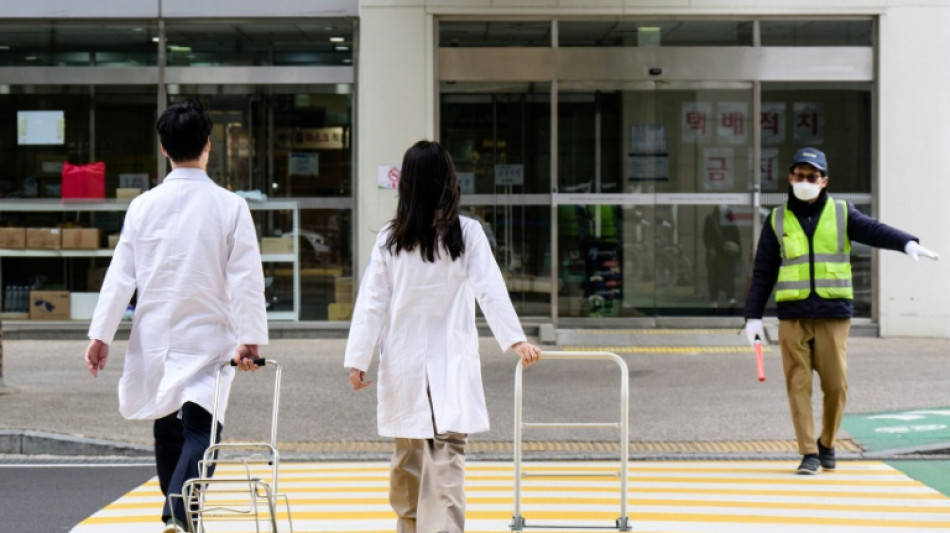
RBGPF
0.4100

From the outside, Seoul's main hospitals seem unchanged: ambulances pull up, patients walk in, staff in white coats walk around purposefully. But for weeks, South Korean healthcare has been struggling.
Surgeries have been cancelled, crucial chemotherapy sessions delayed, and it is nearly impossible to get a walk-in appointment since thousands of junior doctors walked off the job on February 20 in a standoff with the government over medical training reforms.
AFP spoke with those involved:
- Trainee doctors -
The medical reforms, which seek to train up more doctors, plus the government's "draconian" reaction to doctors' opposition is, junior medics say, enough to drive some of them out of the profession for good.
"After this situation is over, I plan to go to a rural area in Yeongdong, North Chungcheong Province, to cultivate grapes," Ryu Ok Hada, a trainee doctor who resigned, said.
Other doctors are thinking: "I could live a happier life by going to the United States and running a food truck. I could make people happy without feeling this level of humiliation," he told reporters.
Junior doctors say they are overworked and underpaid, and argue the reforms will erode service quality while doing nothing to fix core issues in healthcare provision.
"Even if a large number of doctors are produced, if they do not work in essential medical areas and instead move to private clinics or other fields, it does not align with the (government's) initial purpose," Park Dan, the head of the Korean Intern Resident Association, told local media.
- Patients -
Due to existing shortages of doctors and a concentration of medical professionals in the capital Seoul, patients like Jang Sung-ja, who has ovarian cancer, already have to travel hundreds of kilometers for treatment.
But since the doctors went on strike, her treatment has been paused.
"I live in Daegu and the hospital is in Seoul, and I'm just waiting to hear back from them after being informed that the session has been postponed," she said.
"The hospital doesn't really answer when you call them and my children are very worried about me."
Delays and a lack of clarity around treatment plans are increasingly common for patients with major illnesses, which patient advocacy group the Korea Severe Disease Association, says is unacceptable.
"Patients are still missing out on the golden time for treatment," they said in a statement, blaming both striking doctors and the government for the dire situation.
- The government -
For years, successive South Korean governments have attempted to increase medical school enrollment figures and create more doctors to ease shortages, but such reforms have always been abandoned in the face of staunch opposition from medics.
This time, the government is standing by its plan, saying that without rapid reforms the country will not have enough doctors to deal with its rapidly ageing population.
The reforms "cannot and should not be the subject of negotiation or compromise," President Yoon Suk Yeol said.
The plan will see 2,000 more students admitted to medical schools annually from next year to address what Seoul says is one of the lowest doctor-to-population ratios among developed nations.
Doctors who refuse to return to work face legal action, including the suspension of their medical licenses.
- Senior doctors -
Senior doctors have not joined the strikes -- but many have publicly sympathised with their junior colleague's plight, claiming the government training reforms will not do much to fix broader issues.
"Who would benefit the most when there is an excess of trainees in a field? It would be the directors of general hospitals, wouldn't it?" said Chung Jin-haeng, a professor at Seoul National University's college of medicine.
"With an abundance of inexpensive medical personnel, they can assign all of the night shifts to them," she told local media.
- Activists -
South Korea has a government-funded health insurance system which ensures no one will be denied life-saving treatment.
But activists say inequalities still exist.
The healthcare system's biggest problem is that most doctors are concentrated in Seoul, leading to access issues in rural areas.
The private sector also dominates provision, with state-run institutions accounting for just five percent of the total number of hospitals nationwide.
"Regardless of who wins this battle between doctors and the government, neither party has the ability to establish a truly essential alternative -- an enhanced public healthcare system," healthcare activist Yi Seo-young told AFP.
Q.Fiala--TPP